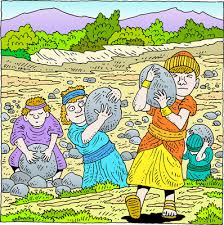Joshua 6:1 – Now Jericho was shut up inside and outside because of the people of Israel. None went out, and none came in.
Hello, readers! As we noted in our last post, verses 13-15 of chapter five should have been the first three verses of chapter six; Joshua's entire encounter with the unknown warrior spans 5:13-6:5. Because this narrative has been split apart, let me just briefly review what has already occurred.

After celebrating the Passover, Joshua had an encounter with an unknown man who identified himself as the commander of the Lord's army. His purpose was to assist Israel in the fight against Jericho. Some people believe the 'man' was an archangel, others believe it was actually Jesus. For the purposes of our study, we will assume the 'man' was Jesus, which makes this event a theophany - a visible manifestation of God to humankind.
This verse (6:1) sets the stage for what is to follow. It tells us that Jericho was shut up 'inside and outside'.
Back in that day it was common practice for a city to have its gates wide open during the day, so that business and travel could occur without difficulty. Likewise, the gates were shut at night for protection. But after the appearance (and escape) of the two spies as well as Israel's miraculous crossing of the Jordan, fear seized the hearts of the people of Jericho.
As a result, the king ordered that the city be put into lockdown. Everyone, including the people living outside the walls, hurriedly came into the city and the gates were tightly shut. At that point, no one was allowed to leave or enter the city for any reason.
Although that seems to make sense, it was a bit unusual. Even when the city was under such a state of emergency, military personnel were often sent out to either harass the enemy or gather information. Small bands were also sent out to acquire help and supplies. The fact that absolutely no one was leaving the city reflects just how desperate the citizens of Jericho were.
In addition, the king would have taken the precaution of stationing troops at various points within the city, to watch for an enemy assault. When an attack came, Jericho was not going to be taken by surprise.
Thus, the scriptures reveal how fortified and well prepared the city of Jericho was. Israel had no chance of defeating the city through a surprise attack. Their only option was to win the battle by overwhelming force, which seemed unlikely in the natural realm.
Joshua 6:2 – And the Lord said to Joshua, "See, I have given Jericho into your hand, with its king and mighty men of valor."
Although Israel had fought in several battles prior to this, they had no experience with walled cities. The conquest of a walled city was a major challenge which often required sieges that lasted for years on end. During that time, the attacking nation used huge amounts of resources (especially food and water) to sustain the siege. Obviously, this was a situation Israel was not prepared for.
Knowing this, we can imagine how relieved Joshua was when the Lord assured him that God was going to give Israel victory over Jericho. In fact, if you read the text again you will find that God speaks of the defeat of Jericho in the past tense – as if it had already occurred!
Scripture tells us that God knows the end from the beginning, and his plans/purposes will always come to pass:
Isaiah 46:9-10 - Remember the former things of old: for I am God, and there is none else; I am God, and there is none like me, Declaring the end from the beginning, and from ancient times the things that are not yet done, saying, My counsel shall stand, and I will do all my pleasure:
Accordingly, God saw the city as already being in the hands of Israel; their victory was certain even though they had not yet begun to fight. This was a sharp reminder to Joshua that victory comes by the hand of God, not through natural physical strength (Psalms 108:12-13).

So basically, we can say that Israel would see the walls/fortifications of her enemy fall as long as she stepped out in faith. If she partnered with God and did as he instructed, she would have victory.
The church is in the same situation today. We have enemies that are strong and well-fortified; we cannot subdue them in our own strength and wisdom. But if we will depend on the Lord and follow the commands he gives us, we will see our nation, our schools, and our culture transformed by God through the power of Holy Spirit.
Zechariah 4:6 - Then he answered and spoke unto me, saying, This is the word of the LORD unto Zerubbabel, saying, Not by might, nor by power, but by my spirit, says the LORD of hosts.
The saving of our nation and culture may look hopeless, but remember – we serve the God of the impossible (Luke 1:37)!
It is interesting to note that when Israel tried to enter the Promised Land the first time, one of the main reasons the 10 spies refused to go in was that the walls of the cities of Canaan were 'very high and sturdy' (Deuteronomy 1:28). If only they had responded to God in faith, they too could have seen and experienced the walls of the enemy falling at their feet.
The Lord now goes on to give Joshua very specific instructions on how to defeat Jericho. As we would expect, the instructions had little or nothing to do with military might or prowess. The victory was miraculously given to Israel by God, after public praise and worship.
Joshua 6:3-4 – "You shall march around the city, all the men of war going around the city once. Thus shall you do for six days. Seven priests shall bear seven trumpets of rams' horns before the ark. On the seventh day you shall march around the city seven times, and the priests shall blow the trumpets."
God's instructions were simple. Israel was to make one lap around the city each day for six consecutive days. This made no military sense, but that is okay; military skills were not going to win this battle – faith was. The seemingly senseless marches around Jericho were a test of faith for Israel.
We are not told which order the people marched in. Some commentators speculate that they marched in the same order as they did when they marched around the wilderness (Numbers 10:14). Others feel the soldiers marched in random order, or that the trans-Jordan tribes went first. We will take a closer look at this issue later on.

On the seventh day, Israel would make seven laps around Jericho. This time the priests would be sounding their ram horns and eventually a command to shout would be given.
The number seven (the number of divine perfection and completeness) is very prominent in the conquest of Jericho. For example, Israel marched seven laps on the seventh day and seven trumpets were blown. This, along with the presence of the priests, the use of ram horns instead of silver trumpets, and the presence of the Ark all indicate that this victory was religious in nature.
Despite the opinions of people in the modern day, there can be no question that Israel received this land by the will and decree of Almighty God. No other people group or nation has a claim on this land. It belongs exclusively to the nation of Israel.
Meanwhile, inside Jericho, all routine pursuits had been given up and every effort was being made to defend the city. The unexpected and seemingly senseless daily march around the wall probably confused and demoralized the defenders. But it was also an act of God's grace. The people of Jericho had ample evidence that Jehovah was the true God. This six-day waiting period gave them time to turn to God and make peace with Israel before their destruction.
Joshua 6:5 – "And when they make a long blast with the ram's horn, when you hear the sound of the trumpet, then all the people shall shout with a great shout, and the wall of the city will fall down flat, and the people shall go up, everyone straight before him."
During the prior six days of marching, Israel was totally silent. That silence was probably more chilling and frightening than any taunts or 'trash talk' that could have been spoken by Israel. Nevertheless, it would not be surprising if the inhabitants of Jericho mocked Israel from the top of the wall as they marched around the city.

But on the seventh day, at the proper signal from the priests, the army was to give a loud, boisterous war cry, intended to intimidate the enemy while simultaneously encouraging each other.
When they did, God would cause the entire wall of the city to collapse all at once. This was something that had never occurred before. Normally when a city wall was breached, there was one central opening, and all the defenders would rush to that spot and attempt to fight off the enemy. But if the entirety of the wall fell down at once, and each soldier entered the city 'straight before' him, then the entire city would be under attack at one time. In the midst of the chaos and confusion (not to mention the fear) that resulted, the army of Jericho would put up very little resistance to the invaders.
We clearly see that God miraculously fights for Israel which resulted in:
- God's name and power being known among the nations of Canaan.
- God receiving the glory for this victory instead of the nation of Israel.
- The people learning to respect/revere the Ark of the Covenant, which represented the manifest presence of God as well as his word.
- The people of Israel having their faith and obedience tested and strengthened.
- The people of Israel being encouraged to fight in all subsequent battles which were necessary to take possession of the Promised Land.
- The false report of the 10 spies (we can't take the walled cities) being forever silenced.
Joshua 6:6-8 – So Joshua the son of Nun called the priests and said to them, "Take up the ark of the covenant and let seven priests bear seven trumpets of rams' horns before the ark of the Lord." And he said to the people, "Go forward. March around the city and let the armed men pass on before the ark of the Lord." And just as Joshua had commanded the people, the seven priests bearing the seven trumpets of rams' horns before the Lord went forward, blowing the trumpets, with the ark of the covenant of the Lord following them.
After speaking to the Lord, Joshua moves into action. These verses seem a bit repetitious to us, but they confirm that Israel was obedient to do all that God had commanded them through Joshua.
Having said that, there are a couple additional points we should consider:
First, scholars are divided on whether or not the civilians of Israel were involved in the march around Jericho.
Some believe that the armed forces were at the head of the line, followed by the priests and the ark, with the general population of Israel bringing up the rear.
Others believe that all the armed forces except Dan were at the head of the line. They believe Dan was behind the Ark and the general population of Israel did not march around the city at all. This opinion is based on the fact that during the wilderness wandering, Dan was always the tribe that brought up the rear (Numbers 10:25).
Still others believe that the fighting men of the trans-Jordan tribes (Reuben, Gad and the half tribe of Manasseh) led the column while the rest of the military forces marched after the Ark.
Any of these opinions could be correct. However, regardless of which troops marched before or after the Ark, I believe that the general population did NOT march around the city. At best, civilians would slow down or inhibit the military men. At worst, they could be injured or killed during the chaos that ensued when the wall fell. Plus, everything in Jericho was to be killed (devoted to destruction) or destroyed. Civilians had nothing to gain by being in the city.
Second, I think we need to place some additional importance on the Ark and its role in this endeavor.
No matter what order the army marched in, there can be no doubt that the Ark of the Covenant was in the middle or center of the procession. We have already established that the literal 10 commandments were kept in the chest portion of the Ark and therefore the Ark represents not only the presence of God, but his word/commands to his people.
Symbolically we could say that the Law of God is at the center of what Israel is doing. The priests who blow the trumpets are the heralds of Gods commands and the military personnel are God's executioners.

It was the word of God/Law that brought Israel through the Jordan. This same Law was to be established in Canaan; the entire Law of Moses rests upon these original commands.
The seven days of silent marching represent the forbearance of God, who patiently gave men room to repent before the cup of their iniquity became full (Genesis 15:16).
Furthermore, in the first year of the Exodus the people of Canaan heard of the miraculous power of God. Subsequently, they had a generation (40 years) to repent and seek the God of Israel, but they did not. The shout given by Israel on the seventh day was a signal that their time of repentance was over.
This can also be taken as a picture of the gospel. Repentance and salvation are the commands of God. Christians are modern day priests in the kingdom of heaven; it is our privilege to 'herald' or publish the good news to everyone (every nation). It is also our responsibility to sound the alarm against sin and wickedness wherever we find it.
God patiently waits until the fullness of time comes; then his people will hear the shout of an archangel and the trump of God as we are ushered into heaven (I Thessalonians 4:16). At that point, the age of grace is over, although there will still be a chance for some to be saved through the tribulation period. Nevertheless, judgment is at the door!
Let this scripture be a reminder to us that TODAY is the day of salvation (Hebrews 3:7). If you are already saved, then today is the day to work for the kingdom. Time passes us by quickly – our lives are no more than a vapor in the expanse of eternity (James 4:14). Since that is the case, if you want to do something for the Lord, take my advice and DO IT TODAY!
Joshua 6:9 –The armed men were walking before the priests who were blowing the trumpets, and the rear guard was walking after the ark, while the trumpets blew continually.
The priests carried the presence of God with them. This was a great encouragement to all the people, especially the soldiers because the sounding of the horn was a sign to the people that God would remember them in the day of battle (Numbers 10:9).
The horn used in this case was not the normal silver trumpet used in battle. God had instructed Israel to use ram's horns. These trumpets were normally sounded during the year of jubilee, signifying complete liberty to all of God's people. Using them in this situation signified not only the liberty of the people of Israel, but the bringing of the land of Canaan into the hands of its rightful owners.
Joshua 6:10 – But Joshua commanded the people, "You shall not shout or make your voice heard, neither shall any word go out of your mouth, until the day I tell you to shout. Then you shall shout."
I once heard a sermon which said that God forced Israel to be quiet for six days, because life and death are in the power of the tongue and if they spoke, they would talk themselves out of a victory!
Proverbs 18:21 - Death and life are in the power of the tongue: and they that love it shall eat the fruit thereof.
How true this is on so many occasions in our own lives!
When a Christian encounters a difficulty in life, our first reaction is to consult with God (and rightly so). We pray, we seek his council, we find scriptural promises that speak to our situation, and we claim that we are standing on faith expecting God to hear and give us victory.
But then we immediately turn around and begin speaking words of death and defeat over our situation. We call or text our friends and discuss the worst-case scenarios of our problem. Instead of praising God, we complain. Instead of seeing the victory as already ours, we question whether God will keep his promises. Instead of acknowledging Jehovah as the God of the impossible, we give Satan credit for power he doesn't have.
And then we wonder why we aren't victorious!
This is an area of life that all of us need to clean up. The bible says that our speech reveals the contents of our hearts:
Luke 6:45 - A good man out of the good treasure of his heart brings forth that which is good; and an evil man out of the evil treasure of his heart brings forth that which is evil: for of the abundance of the heart his mouth speaks.
The next time you are believing for God to do something in your life, make sure you take stock of your speech. You may need to break some old habits, or you may need to seek guidance from Holy Spirit as to why you don't have words of faith coming out in your everyday speech. You may also want to say a prayer and ask God to break any spiritual yokes or bondages that you have placed upon yourself due to your tongue/speech (Matthew 11:30).
Joshua 6:11-12 –So he caused the ark of the Lord to circle the city, going about it once. And they came into the camp and spent the night in the camp. Then Joshua rose early in the morning, and the priests took up the ark of the Lord.
Realistically, it wouldn't take very long to make one lap around the city, even though the soldiers (and priests) kept well back from the walls to avoid getting hit by enemy projectiles. Once the lap was completed, they simply went back to camp. They had lots and lots of time to practice patience during those first six days!

The Israelites must have thought that the victory over Jericho was taking forever!
But the truth is that God was working in the lives of his people, even when it seemed like nothing was happening.
For instance, Israel was practicing obedience. God places a very high value on obedience.
1 Samuel 15:22 - And Samuel said, has the LORD as great delight in burnt offerings and sacrifices, as in obeying the voice of the LORD? Behold, to obey is better than sacrifice, and to hearken than the fat of rams.
As we already noted in today's lesson, only God knows the end from the beginning. Therefore, we should always obey him because we cannot see all of the 'moving pieces' or the final outcome of a situation. When God told Israel to march around the city one time, obedience was the best course of action, even though they may not have understood the reason for it.
There is also the matter of faith. God never fully explain his plans to us at the beginning of an endeavor. He expects us to follow him step by step, so that we don't jump ahead of him or go off in the wrong direction. We must act on his instructions in faith, then wait for the next command. In this scenario, Israel had a chance to exercise her faith in God while she waited for the victory to manifest (I John 5:4).
As for us, we know that God has not changed. He is still very pleased by our faith (Hebrews 11:6).
As previously mentioned, this time delay also gave the people of Jericho a chance to repent and ask for mercy from God.
We can conclude that even though it seemed like nothing was happening in this situation, God was working behind the scenes to accomplish his purposes.
Let me offer you some encouragement and some relief:
We may not want to admit it, but the bible tells us that the words we speak are directly linked to what is in our hearts.
Perhaps, as you read today's post, you realized that you are speaking negative things into your life, into your problems and even into the lives of your family. If so, I am sure you want to correct that – I am sure you want to sow seeds of victory and life instead.
But you can't correct the problem simply by saying to yourself, 'I'm not going to do that ever again'. You will need to change what is in your heart. A great way to begin that process is by taking the advice of the apostle Paul. He says to keep your mind fixed on things that are good, lovely or of a good report.
Philippians 4:8 - Finally, brethren, whatsoever things are true, whatsoever things are honest, whatsoever things are just, whatsoever things are pure, whatsoever things are lovely, whatsoever things are of good report; if there be any virtue, and if there be any praise, think on these things.
I also suggest feeding your mind/heart DAILY on the word of God and keeping a song of praise on your lips. These strategies will get you started.
If this applies to you, I strongly encourage you to start changing your heart right now.It will greatly benefit you and your family.
Let me offer you some strength:
When God spoke to Joshua, he said that Jericho had already been delivered into the hands of Israel. It was a 'done deal'; all Israel had to do was step out in faith and claim the victory.
God has made it very clear that he intends to bring a great awakening or revival to America. There is no need for us to doubt this great victory. Instead, we need to step out in faith and prepare for it.
Here are some things you can do:
- Prepare a short (seriously, like 90 seconds) testimony of what God has done for you. Be ready to share this with others.
- Sharpen your spiritual ears – be ready to interact with someone when Holy Spirit gives you a nudge.
- Examine your church/fellowship. Are you prepared to receive and disciple new believers? How can you be involved in that process?
- Pray, pray, pray! Stand in the gap and pray for God's salvation to reach those you love and those you interact with. Declare his promises over your city and neighborhood.
- Live an exemplary Christian life in front of your peers. Don't compromise and don't react to the world around you in fear. Sinners need to know who they can turn to when the world fails them.
What other ways can you step out in faith and participate in this awakening?

















































